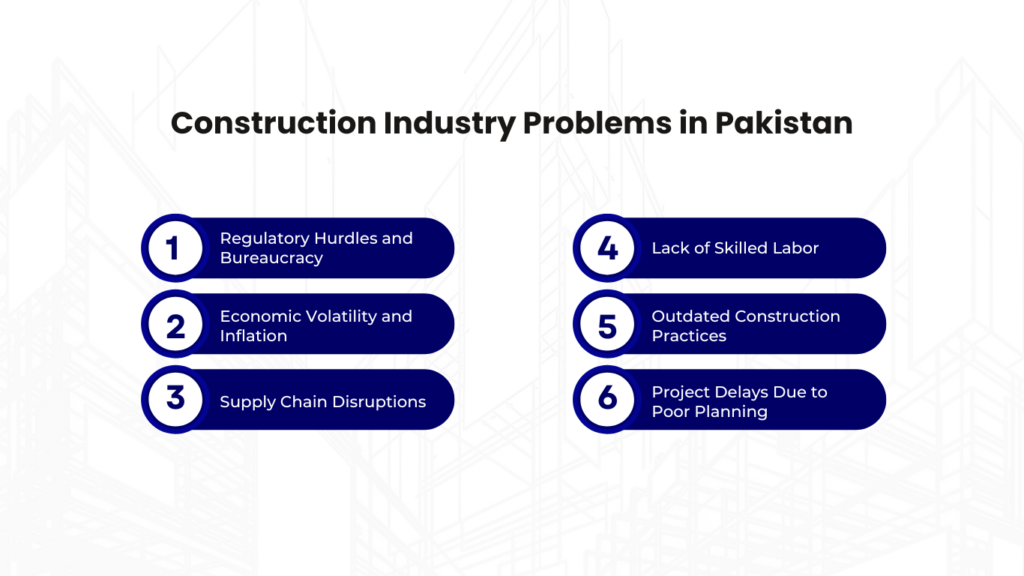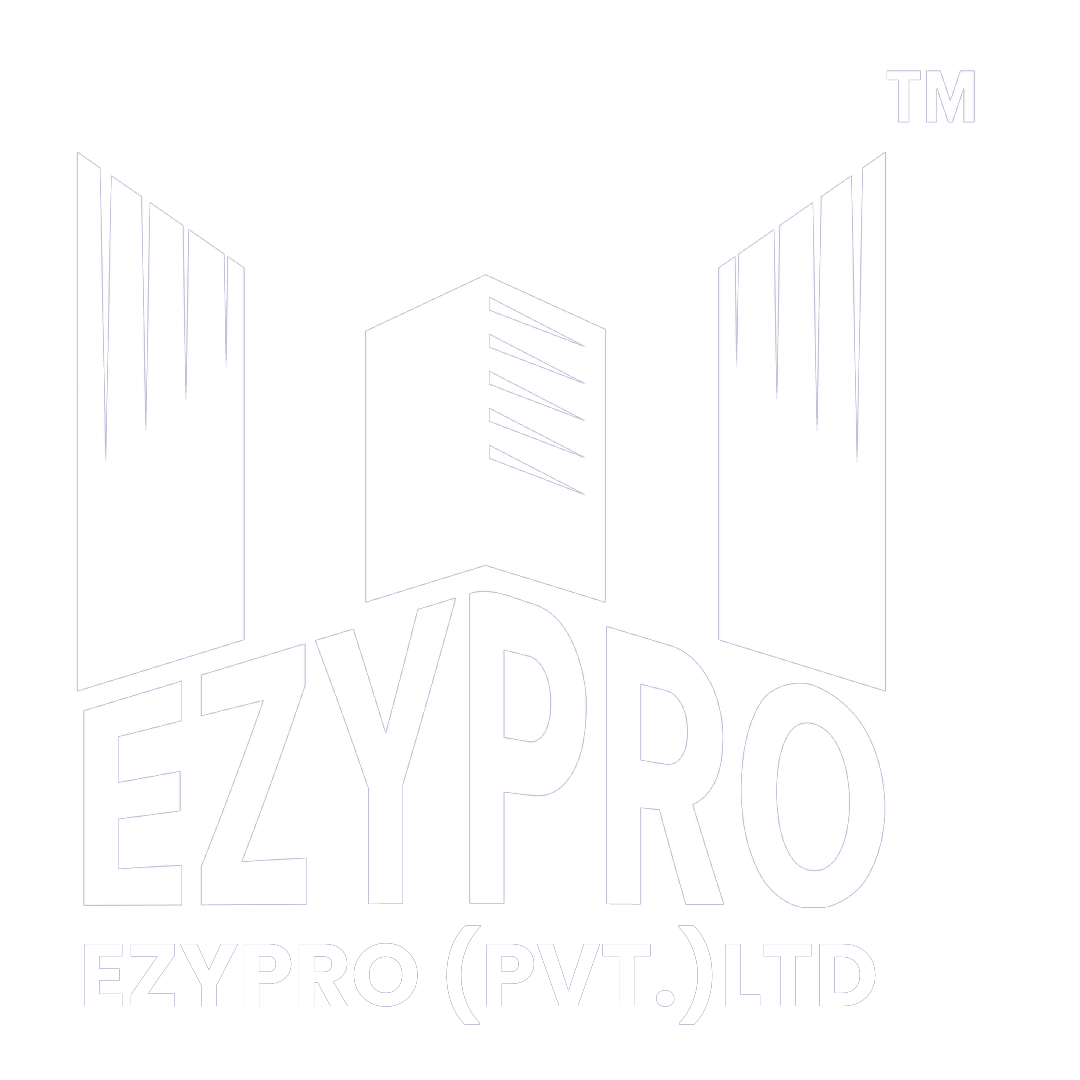Top Challenges in the Construction Industry of Pakistan
The construction industry is a vital pillar of Pakistan’s economy, providing infrastructure for everything from housing to industrial development. However, like many developing nations, Pakistan’s construction sector faces a unique set of Challenges in the Construction Industry that impede its progress. These challenges range from regulatory issues and economic instability to outdated technologies and a lack of skilled labor. Despite these hurdles, there are effective ways to navigate and overcome them.
In this blog, we will explore the top challenges currently affecting the Pakistani construction industry.

1. Regulatory Hurdles and Bureaucracy
One of the most significant barriers to construction projects in Pakistan is the complex and often slow-moving regulatory environment. With overlapping jurisdictions at the federal, provincial, and even local levels, developers often face delays in securing necessary approvals. For example, different provinces have different zoning laws and environmental regulations, and navigating these laws without the help of legal expertise can be daunting.
One of the high-profile examples of regulatory delays in Pakistan is the New Islamabad International Airport. The project was initially scheduled for completion in 2013, but various regulatory hurdles pushed back its completion to 2018. The delays were caused by a combination of slow land acquisition processes and long waits for environmental and other governmental clearances. The project’s cost overran by billions of rupees, highlighting the significant financial impact of regulatory bottlenecks.
The best way to tackle regulatory delays is to stay proactive and informed. By staying up-to-date with evolving regulations regarding land acquisition, labor laws, and building codes, construction firms can avoid unnecessary penalties and delays.
Leveraging construction management software like EZYPRO can streamline the documentation and compliance process. With automated workflows, the software ensures that paperwork is handled efficiently and approvals are tracked, reducing the likelihood of bottlenecks at the regulatory stage. Having legal consultants and regulatory experts on the team can also help navigate this complex environment effectively.
2. Economic Volatility and Inflation
Pakistan’s economy has been volatile, with fluctuations in inflation, interest rates, and exchange rates. These economic shifts impact the cost of construction materials, labor, and even financing options. High inflation rates increase the cost of key materials like steel and cement, making it harder for developers to stick to their original budgets. According to the Pakistan Bureau of Statistics, inflation in construction materials soared by 20% between 2020 and 2023. Such a steep rise puts immense financial pressure on construction firms, often causing project delays or forcing companies to compromise on material quality to stay within budget.
Additionally, the devaluation of the Pakistani Rupee against the US Dollar means that imported materials have become more expensive, creating budget shortfalls for projects that rely on foreign-sourced equipment or materials. For developers working on long-term projects, these costs can be devastating, as initial budgets fail to account for unexpected economic swings.
Construction management tools that track expenses in real-time can help developers monitor budget overruns early on. EZYPRO offers comprehensive cost management features that allow you to keep track of every expenditure and optimize resource allocation.
3. Supply Chain Disruptions
The construction industry in Pakistan is heavily reliant on imported materials, making it vulnerable to supply chain disruptions. Whether due to political instability, import restrictions, or logistics issues, delays in material delivery can significantly hamper project timelines. These disruptions also affect cost estimations, causing project budgets to exceed initial forecasts.
Some hydropower projects in Pakistan have faced severe delays due to disruptions in the supply of critical imported equipment. Global trade restrictions, currency devaluation, and port congestion led to months-long delays in the delivery of key materials, causing projects to overshoot their deadlines and budgets.
4. Lack of Skilled Labo
The construction industry in Pakistan suffers from a significant shortage of skilled labor. According to the Pakistan Bureau of Statistics, 75% of workers in the construction industry lack formal training. Many projects are delayed or compromised in quality because workers aren’t fully equipped with the necessary skills to handle modern construction techniques. This issue is exacerbated by the country’s “brain drain,” where highly skilled professionals leave Pakistan for better opportunities abroad
The Orange Line Metro Train project in Lahore faced substantial delays partly due to a lack of skilled labor. The construction required advanced tunneling and track-laying skills, which were in short supply locally. As a result, project managers had to rely on expensive foreign consultants and contractors to complete critical portions of the project, driving up costs and pushing back completion by several months.
Investing in the training and development of workers is essential. Companies can offer on-site vocational training programs that provide workers with the technical knowledge and skills necessary for modern construction methods. Partnering with local training institutions and government bodies that offer technical and vocational education training (TVET) programs can also help bridge this skills gap.
Implementing cutting-edge technologies, such as automated machinery and construction management software, can help bridge the gap caused by a lack of skilled labor. EZYPRO can streamline tasks like scheduling, cost control, and workforce management, ensuring that available workers are used efficiently.
5. Outdated Construction Practices
Pakistan’s construction industry still relies heavily on traditional building methods, many of which are outdated and inefficient. These methods often result in project delays, increased costs, and low productivity. The global construction industry is increasingly adopting modern technologies such as Building Information Modeling (BIM), 3D printing, and modular construction, but Pakistan lags in adopting these innovations.
A study conducted on the Neelum-Jhelum Hydropower Project highlighted the inefficiencies of outdated methods. The project, which was initially set for completion in 2016, was delayed by over two years due to inefficient construction practices and a lack of modern planning tools. This not only increased the project’s cost by nearly PKR 100 billion but also delayed its expected benefits to the region’s power grid.
Transitioning to modern construction methods like prefabrication, modular construction, and BIM can drastically reduce project timelines and costs. These techniques offer higher accuracy, better resource management, and quicker project turnaround.
Investing in technology like EZYPRO for real-time tracking, scheduling, and quality control can transform your construction operations. By digitizing workflows and automating repetitive tasks, companies can improve efficiency while reducing the likelihood of costly errors.
6. Project Delays Due to Poor Planning
One of the most pervasive issues in Pakistan’s construction sector is project delays, often caused by poor planning and lack of coordination among stakeholders. Whether it’s a delayed supply chain, miscommunication between teams, or unforeseen environmental conditions, many construction projects end up exceeding their deadlines. Such delays not only increase costs but also tarnish a company’s reputation in the market.
Project delays can often be traced back to inadequate project management. Using construction project management software like EZYPRO ensures that project timelines are clear, resources are allocated efficiently, and any potential roadblocks are addressed early on. Poor communication between stakeholders can lead to costly mistakes and delays. Using a centralized communication platform, where all team members can access real-time updates and share critical information, can help keep everyone on the same page.
The New Islamabad International Airport project faced severe delays due to poor project management and planning. Initial timelines underestimated the complexity of the project’s scale, and as a result, supply chain disruptions and communication gaps between contractors led to a five-year delay in completion. The total cost of the project increased by more than 50%, severely impacting the government’s budget.
Conclusion
The construction industry in Pakistan is undoubtedly facing significant challenges, but with the right strategies, these hurdles can be overcome. Whether it’s embracing modern construction techniques, using construction management software like EZYPRO, or investing in a skilled workforce, there are actionable steps that companies can take to thrive in this competitive environment. By addressing regulatory hurdles, controlling costs, training workers, adopting new technologies, and improving project planning, construction firms can not only overcome these challenges but also set themselves apart as industry leaders.









1 Comment